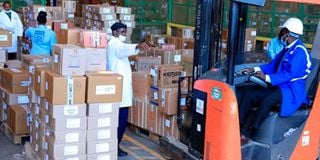Recalled ARVs to be returned to maker

ARVs being sorted for distribution at a Kenya Medical Supplies Authority warehouse in Embakasi, Nairobi, on April 22, 2022.
If you received antiretroviral (ARV) drugs in a white bottle stamped with blue wordings ‘Universal Corporation Ltd’, then you need to return it to your pick-up facility.
The bottle, according to the Pharmacy and Poisons Board, has a yellow stripe at the top and the writings are on the side.
The clarification came after some patients and rights groups complained of confusion over the nature of the drugs that had been recalled.
“The drugs are in a white bottle with black writings on the side and the wordings ‘Universal Corporation Ltd’ (in blue). The recipients are being requested to return the drugs to the facilities,” said Dr Fred Siyoi, chief executive officer, of the Pharmacy and Poisons Board.
The recall is strictly on all Tenofovir/ Lamivudine/Dolutegravir 300/300/500 mg (TLD) tablets manufactured by Universal Corporation Limited.
It is reported that there is discolouration of the induction seal and the tablets are changing colour, so are the bottle covers.
Compromised drugs
However, the National Empowerment Network of People living with HIV/Aids in Kenya (Nephak) is concerned that some of its members received the compromised medicine, but in different packages, citing their safety.
“When you tell our members to return their doses when some hospitals don’t offer a replacement, then you want them to die. We are alive because of the drugs,” Mr Nelson Otwoma said.
He questioned the fate of users who have been adhering religiously to contaminated drugs.
“This is joking with people’s lives! In as much as we are doing our best to return the drugs, the damage is already done! There are people who have taken it for months. What will happen if they withdraw and embark on drugs from other manufacturers?” he asked.
The drugs were ordered by Kemsa through the UCL that is prequalified by the World Health Organisation and paid by the Global Fund.
Acting director general for health , Dr Patrick Amoth, said that there is a sufficient national stock of TLD from other brands that could last the country for the coming six months, adding that only the batch manufactured by UCL is affected.
The Ministry of Health (MoH)has since come up with a tool to help counties and hospitals monitor the stock that they currently have as PPB and Kemsa work out how the recalled tablets will get back to the manufacturer.
The process is being coordinated by Kemsa and PPB, which has since collected samples of the drugs from various facilities for further analysis at the quality control laboratories .
“We are following up with our team and doing quality analysis on the cause of the reported discolouration of the product and the implication on the clients’ safety,” Dr Siyoi said.
“As we await the results, we urge the recipients of care to seek assistance from their healthcare providers,” Dr Amoth said.
MoH has since instructed facilities to accept back the drugs and quarantine them as they issue clients with TLD medicine from other manufacturers.





